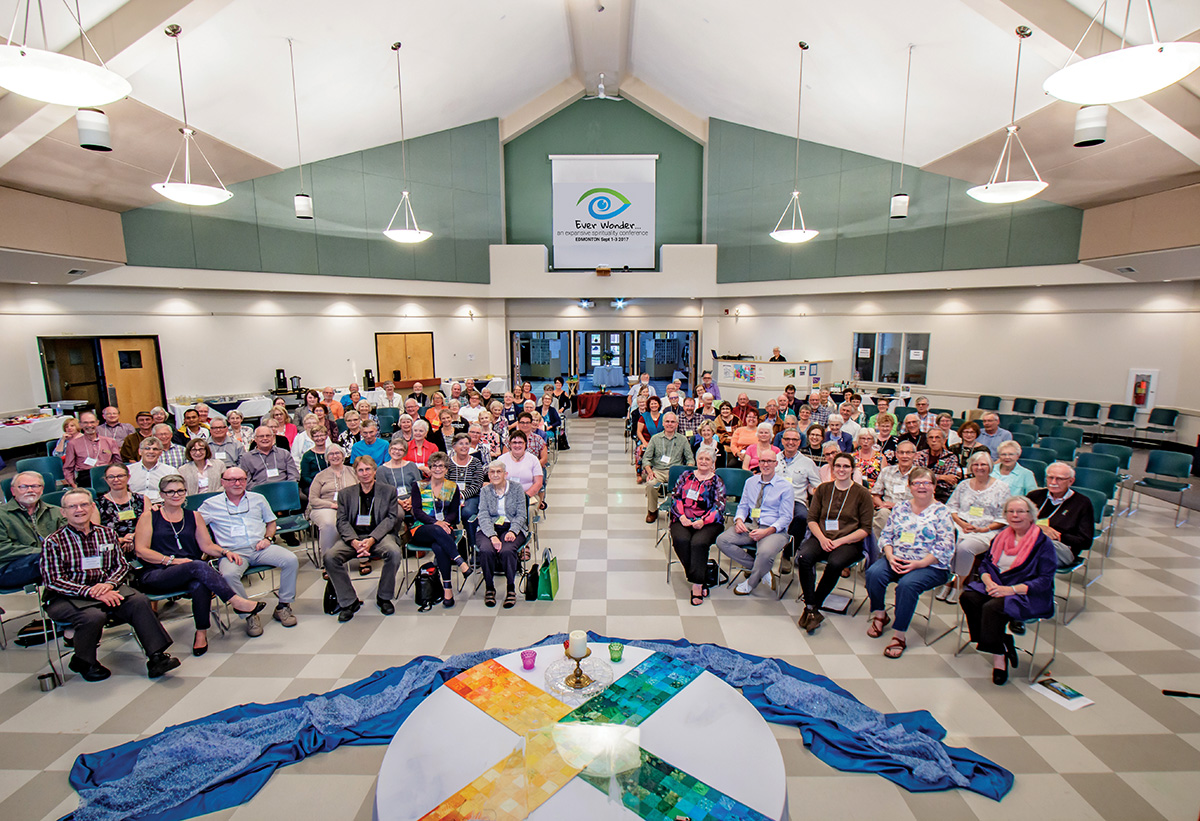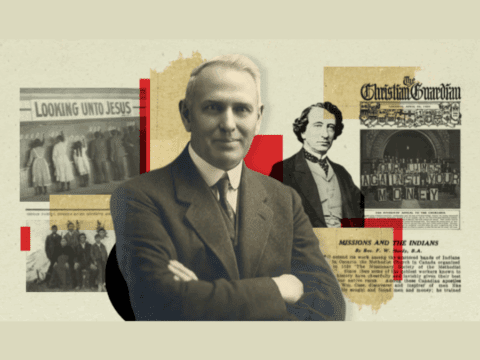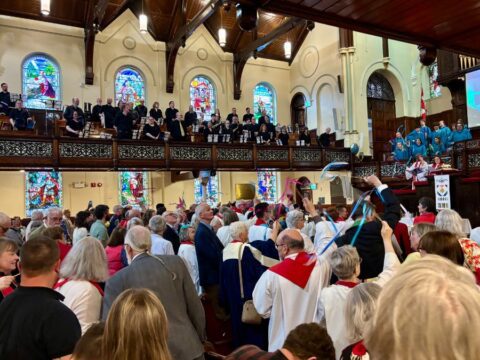I settle into my chair on a warm Friday evening last September at Southminster-Steinhauer United in Edmonton. Intricate rainbow quilts frame the front window, looking out onto spruce trees. The gathering space is lofty, inviting and bubbling with the enthusiasm of those around me.
I should be excited, too. I grew up in The United Church of Canada. I’ve worked at United Church summer camps, often as a chaplain, for over a decade. I’m an inquirer for diaconal ministry. I should feel at home, but instead I feel deeply anxious.
I take some deep breaths.
I’m at Ever Wonder, a three-day “expansive spirituality” conference for “spiritual seekers who are open to wisdom from many sources, eager to learn from one another and willing to explore beyond the boundaries of belief systems.” My thoughts are churning: What if I enjoy it too much? Will I still be welcome to pursue my call to ministry within the United Church? What if the word that best describes my spirituality is “post-theistic”?
Looking around the room, I see a typical United Church crowd: there is a lot of silver hair. At age 30, I’m the youngest here by at least two decades. As my seatmate puts it, these are “the converted.” Many have come to their perspective on spirituality from inside the United Church, through reading liberal theologians such as John Shelby Spong, Marcus Borg and others — often when their original theological framework no longer fit with their lived experience. Some of the attendees use terms like “progressive Christian,” “post-theist,” “non-theist,” “atheist” or “non-religious” to describe themselves. And as the conference progresses, participants repeatedly state that their religious understanding has arisen from — and is consistent with — what they learned in the United Church. Put simply, the denomination gave them a “God is love, and the Bible is to be taken seriously but not literally” point of view. Sound pretty United Church? I thought so, too.
But that all depends on what you hear in church. Some churchgoers read the Bible literally; others understand it as a legend, story or metaphor. Additionally, between these two ends of the spectrum lies a middle ground that Borg called “soft literalism” in his 2011 book Speaking Christian. For this type of believer, he argued, the story of Jonah living inside a fish for three days might be read as parable, but the “really important events happened more or less as described.”
And then, of course, there’s God. Or is there? Rev. Nancy Steeves, minister of Southminster-Steinhauer, says most people at the conference have let go of “an interventionist, person-like, divine super-being up there.” For some, it follows that there’s no God at all, but others still allow for the possibility of something more. Steeves says conference attendees hold a range of beliefs. Some have a panentheistic understanding — “everything is in the sacred, and the sacred is in everything.” Others believe that “love is God, and our supreme values are the sacredness.” Still others would simply say there is “some kind of presence.”
Since we all have different beliefs, there’s no mention of God or Jesus at the conference’s Sunday morning gathering. The songs we sing are originals, with language designed for such a service. Otherwise, the gathering is familiar, with a storytime for children, a reflection and readings. One reading is a paraphrase from Exodus. As Steeves puts it, the burning bush passage is about “a character named Moses . . . with that archetypal story of a journey hero.” Then, instead of closing the reading with the traditional phrase “the word of the Lord,” she concludes, “this legend of ancient Israel, passed down to us in ways which became scripture for Judaism and Christianity.” We respond in unison, “May we find wisdom for our living.”
Even without the word “God,” the service evokes a feeling of awe and of sacred connection to the world. The language is refreshing. I’m never jarred out of my reverie, surprised by a rogue use of the word “sin” or shocked by a sudden unexplained “salvation.” In fact, I never have to say to myself, “They mean that as metaphor.” This is mentally freeing for me. I also appreciate that while the leaders don’t use the language of faith, I am allowed and welcome to bring my spirituality and beliefs into this expansive gathering. The inclusive language — or rather, non-exclusive language — allows a space for everybody.
This isn’t the case in most churches. Many people at the conference simply grew tired of perpetually reinterpreting the language of worship as metaphor. Marilyn Blackall, a retired teacher and a member of Southminster-Steinhauer, remembers feeling “frustrated by the language being used, both spoken and sung” at her previous United church, where she also served as the choir director and pianist. She knew she “needed to make a change in order to live authentically,” but it was “a very difficult decision” to leave her congregation. “People in that church had been family to me and my family for over 30 years,” Blackall says. She experienced “significant loss . . . and grieving.” Many of the United Church attendees at this conference could say the same.
It’s difficult to estimate the number of progressive Christians within the big tent of the United Church. Southminster-Steinhauer minister Rev. Christopher New says that since “progressive Christianity has such a wide definition, many places could be said to be exploring these ideas.” As for United churches that actively use post-theist or post-Christian language, New says there are only a handful. The movement is “really small in terms of congregations that are exploring this as whole communities.” He adds that Southminster-Steinhauer wouldn’t necessarily define itself as post-theistic so as not to create a barrier for those congregants who do believe in a theistic God.
When it comes to individuals, the movement seems to be much bigger, with pockets of people in churches and study groups across the country. Ever Wonder was sold out with 155 participants and a waiting list. Almost every province in the country was represented. Over 250 people attended the public presentation, and over 800 people viewed the conference, or portions of it, online.
Other organizations and events provide more insights. The Canadian Centre for Progressive Christianity had 1,000 people on its mailing list when it folded in 2016. And 60 people attended the sold-out gathering “Progressive and Expansive Christianity on the Prairies” in Davidson, Sask., in November 2016, an event organized by the Faith Formation Network of the United Church’s Saskatchewan Conference.
Naturally, the progressive movement is much older than the current conversation sparked by the atheist United Church minister Rev. Gretta Vosper, who was one of the conference speakers and is still awaiting a hearing on her employment status. But it’s Vosper’s name that comes up most frequently. For panellists speaking about their journeys into an expansive spirituality, Vosper’s writing helped them articulate what had been going on for years in their spiritual lives. Blackall, for example, says she found Vosper’s words “liberating.” She says they helped her see, “for the first time, some of the same things I had been thinking and feeling.”
Indeed, conference attendees overwhelmingly support Vosper. Her insightful, spirited and often funny presentations at the gathering are met with standing ovations. People express concern for her, and also for themselves, in what some call “the current climate” of the United Church. This is addressed during a panel discussion that asks, “Is there a place for non-theists in The United Church of Canada?” Perspectives are divided. Panellist Margaret-Ann Armour, who is the chair of the board of the United Church-affiliated St. Stephen’s College at the University of Alberta, begins her segment with a resounding “I hope so!” and concludes with optimism for the future. Panellist Fabian Jennings, a Southminster-Steinhauer congregant with a post-theist world view, says he would like to hear the United Church say, “Yes, you’re welcome in the church, and no, you don’t have to surrender your integrity to win that welcome.” As for that prospect becoming a reality, Jennings says he has “the gravest doubts.”
Despite concerns like these, the tone of the weekend is upbeat. In small groups, we discuss the challenges and richness experienced on our spiritual journeys, as well as what we need in order to further enrich our paths. The chatter at meals and between sessions is all about what is being learned and heard. Contact information is exchanged as strangers, who now seem like old friends, pledge to stay in touch. Breakaway workshops cover topics such as the story of our unfolding universe, our connection to the natural world, the values-based wisdom from the Jesus tradition and how to transition spiritual gatherings into a more expansive expression of spirituality.
Saturday night, the chairs are arranged coffee-shop style. We sip wine while enjoying a play and live music. The space seems to hum with possibility. As for the token young person, the anxiety I felt on the first day has lifted. I’m feeling right at home.
For me, the most fascinating speaker is Autumn Reinhardt-Simpson, author, doctoral theology student and “post-theistic Anglican” who “revel[s] in God language.” She talks about how belief and unbelief are “often posited as our only two choices, as in, you either believe in a theistic god, or you don’t believe anything at all.” She says that we shouldn’t be so determined to label different types of beliefs, and we should remember to define the terms for ourselves, while also asking if the terms “might mean something different to others.” I haven’t pictured God as a literal deity for years, and Reinhardt-Simpson seems to be describing me when she says, “Many people are unaware of the idea of post-theism despite . . . being functionally post-theist.” She jokes with me after her talk, saying, “Some days I feel more theistic than others.”
This fluid language resonates with me, making my “spiritual crisis” feel more like a spiritual adventure. I still have concerns, and I still worry about my welcome in the United Church. I do know that I want to be open about my journey, and so do my fellow conference attendees — my silver-haired mentors, who already know where they stand. We want to explore and wonder in our home, our United Church.
This story originally appeared in the February 2018 issue of The Observer with the title “United in wonder.”















